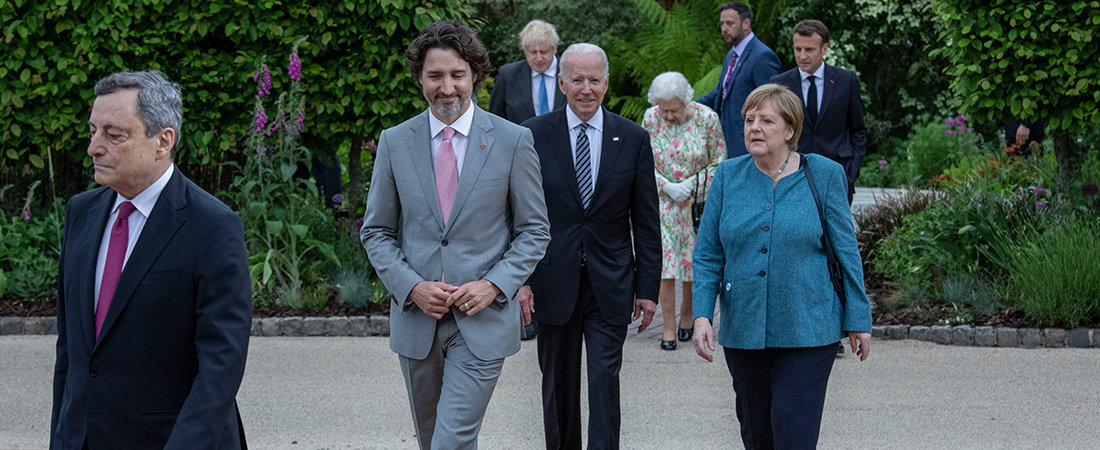Last week’s G7 summit in Cornwall was described by many as a return to normalcy for global democracies – more importantly, it was a test of the highly anticipated “reset” of the transatlantic relationship.
Below, Julian Graham, Carmen Bell and Jasmin Gabel of Portland’s Washington DC, Brussels and Berlin offices lay out the US-EU-German perspectives of the summit, including how US President Joe Biden fared with a Europe embracing its newfound sense of sovereignty and autonomy.
Perspective from DC
Biden’s address to the Munich Security Conference earlier this year revolved around his willingness to not only restore American global leadership, but recognise Europe as a key player standing alongside him. He wanted to turn the page from the Trump administration’s haphazard approach to diplomacy. In this regard, he succeeded, but substantive progress remains elusive.
Americans viewed Biden’s performance in a number of areas as less than stellar. Critics panned the G7 vaccine pledge as too little too late. A trade truce on the Boeing-Airbus dispute elicited muted responses from American trade watchers who have waited 20 years for a resolution. While American press focused on Biden’s efforts to unite Europe in confronting China, some – notably Germany – remained reserved on this point, hindering a comprehensive action plan.
What interestingly dominated American headlines was an event to which European leaders did not attend. Biden’s bilateral meeting with Russian President Vladimir Putin was the highly anticipated capstone to his first overseas visit. Despite annoyance from the G7’s European attendees (who reportedly did not know about the sit-down until last minute), low expectations for the meeting were met across the Atlantic. American press praised Biden for “wiping the smirk” off Putin’s face and labelled the meeting a success in comparison to Trump’s widely panned 2018 press conference with Putin in Helsinki.
While Biden reintroduced predictability and stability as pillars of US diplomacy, the above demonstrates a more fractious transatlantic relationship than most news reports suggest. The EU-US trading relationship is still dominated by tit-for-tat tariffs and there are fundamental disagreements over how to approach China’s dominance. This trip was designed to rebuild America’s reputation, but it will likely take longer to escape the legacy of America First diplomacy.
Perspective from Brussels
As a “non-enumerated” member since 1981, the EU’s participation in G7 meetings – this time represented by European Commission President Ursula von der Leyen and European Council President Charles Michel – tends to be largely symbolic. It neither holds the rotating G7 Presidency nor does it have as much leverage over the final G7 communique as its national counterparts. Likewise, the bloc can be key for establishing cooperative initiatives, as done at the EU-US Summit last week with a joint Trade and Technology Council and Climate Action Group.
This year’s outcomes however suggest little more than vague commitments to support businesses looking to scale up and facilitate the green and digital transition. There is no date set to stop using coal, a toothless agreement on technological global standards (notable with the EU’s Digital Markets Act and Digital Services Act already well underway) and – considering political divisiveness in both the EU and the US – an uphill battle for the G7 agreement on a 15% minimum global corporate tax.
But symbolic gestures may be just what the transatlantic relationship needs. Brussels media fawned over Biden’s sit-down with Macron, during which Macron welcomed him “into the club”, and there is high anticipation over Merkel’s visit to the White House on 15 July. The EU-US Summit was also hailed a major “milestone”, while the five-year suspension of tariffs arising from the Boeing-Airbus dispute (in contrast to how the American press reported) was lauded as a breakthrough.
What this suggests is more strategically economic and cooperative engagement between the EU and the US in the future, as opposed to one where the EU stays complacent in the comfort of American leadership. There is a role for Washington to play in Europe’s development, so long as Biden recognises the bloc’s desire to be considered an equally influential and competitive global partner.
Perspective from Berlin
Angela Merkel joined this year’s G7 summit as the veteran of the group. When she first attended the summit in 2006, the world and the relationships between the members of this elite club of world leaders looked vastly different. For one, it was still called G8 and included Russia. But Merkel’s struggle with strongmen continued when Trump and his “America First” policy created deep rifts in the transatlantic ties. Biden’s attendance to the G7 this year signalled a return to the norms Merkel was used to, a cooperative transatlantic partnership and “a rules-based international and multilateral cooperation mechanism”.
There is no questioning the general euphoria that was felt around the return of a reliable and conscionable US-American Partner, but it wasn’t all kisses and hugs (or rather, for now, elbow bumps and smiles). Biden’s focus on China would be a sore point for Merkel, pitting Germany’s own economic interests in China’s new Silk Road against the disregard for human rights, territorial independence or climate change. Merkel’s non-confrontational governing style further limited the eventual tone the final G7 communique could take on this issue.
Biden and the other G7 members may not have to hold back much longer. Merkel is due to retire after German elections later this year. Whether it is her Christian Democrat Union colleague Armin Laschet or Greens candidate Annalena Baerbock that secure the Chancellery, a stronger stance on China has been signalled by both. Their entry into the G7 could reveal a new political dynamic in the years to come.
About the authors
A Director in Portland’s Brussels office, Carmen advises clients on EU public affairs, strategic communications and pan-European campaigns.
An Associate in Portland’s DC office, Julian specializes in providing research and analysis to a variety of government and corporate clients.
A Consultant in Portland’s Berlin office, Jasmin advises clients on government affairs, strategic communications and international alliance building.

